The wailing arson victims
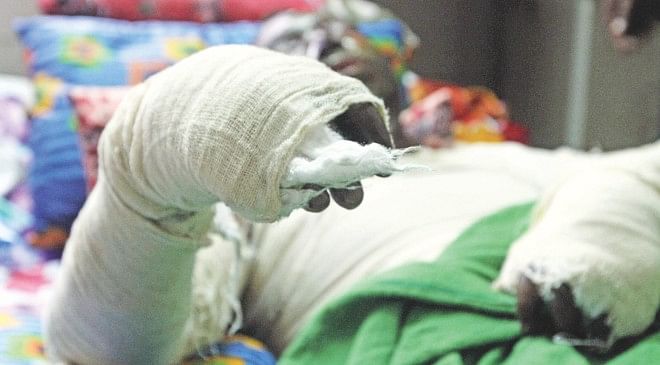
During the months November and December of last year, street agitators and political activists brought forth people's worst nightmares about death. For the sixty people set on fire, death came not as a sudden jolt of pain, or a sweet reunion with a long-awaited friend. It came as a prolonged session of torture, a slow incineration of the body long after the flames were extinguished.
A handfull withstanding, none of the victims of arson died instantly, instead losing life bit by bit.
At least 130 people suffered agonizing injuries from petrol bomb and cocktail attacks. Among them 103 were treated in Dhaka Medical College Hospital only.
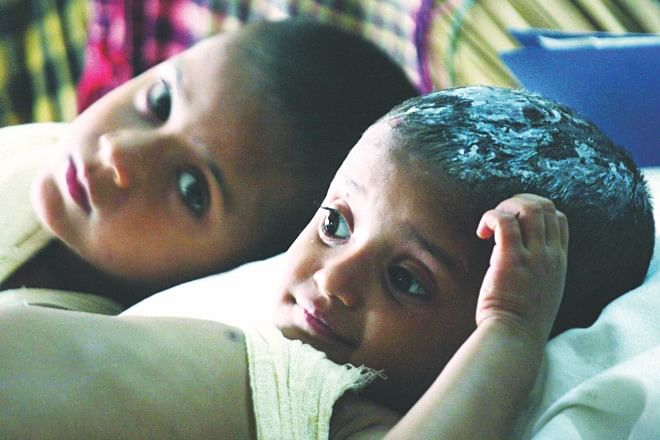
All for showing the audacity of choosing to lead their daily lives while the BNP-led 19 party alliance paralyzed the country with 51 days of hartals and blockades from late October to early January.
None of those burnt would have been so had they had the safety of a private car and a cushy job. A large majority included truckers and drivers of CNG auto-rickshaws, human-haulers or buses. The rest were passengers who would not have used public transport had they had the option.
Deceased Nahid, 18 was a farmer trying to go to Malaysia, dreaming of a better life. He was in Dhaka to get his papers processed when his bus was set on fire on November 28 at Shahbagh, his dreams burning away with the flames.
His brother Robin, who also died in the same incident, worked in a sweater factory. His wife was five months pregnant.
Neither of the brothers would have been on a rickety public bus if they were better off. Both of them may have been alive yet, if they could have afforded it.
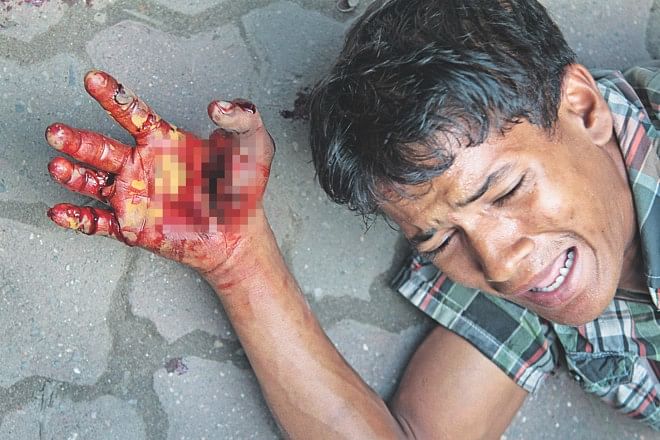
Even those who survived the attacks, claim that they cannot afford to have lived.
Lokman who was burnt on January 1 in Gazipur broke down in tears at the thought of having to pull his daughters away from school.
"My elder daughter had to be married off during her high school. I wanted my second daughter to finish her school and go on to university," said the grieving father, tears swelling in his infected swollen eyes.
It was the middle of January and he had still not been able to manage money to pay the admission fees of his three younger daughters, and feared that he would not be able to do so. The youngest is still in primary school and already facing the threat of a life without the light of education.
"When I was set on fire, I knew that it was just my face that was burnt, not my entire body. I knew that I could still save myself. I jumped out of the burning truck and used my muffler to smother the flames of my face. Now when I look at the future, I wish I had not done it..." sobbed Lokman, sitting in his bed at the High Dependency Unit (HDU) of Dhaka Medical College Hospital.
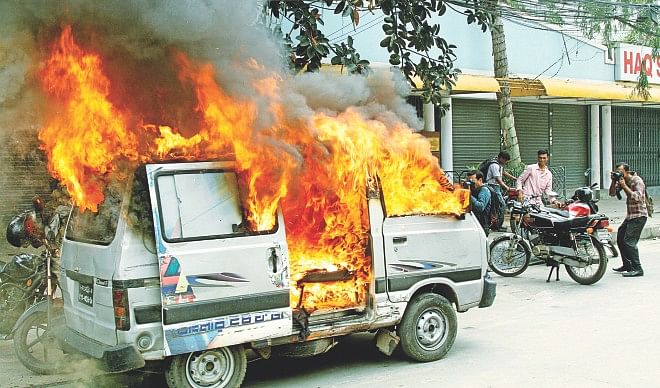
Trucker Abu Mian had been shifted out of the HDU to a general ward, but he still had little to be happy about. Staring at his burnt hands which were just beginning to form tender pink skin, he sighed. "It will be a long while yet till I can drive again. The picketers set fire to the part of me that can kill me and my family," he said. He was burnt on December 24 and it was already the middle of January, yet he was far from fit.
There is really no forgetting the sights, sounds and smells of the burn unit of Dhaka Medical College Hospital.
It begins at the gates with the shock of watching a blackened, burnt human form arrive in a speeding rickshaw. Before the sight can be fully registered, the three wheeler halts and the human form tilts to the ground. A thousand hands cry out and stretch towards the heaving mass.
Goldsmith Montu Chandra Paul had arrived like this on November 10. Even with ninety percent of his body burnt, this man with his extreme will to live, had hailed a rickshaw and arrived to DMCH from Laxmibazaar, where he had been set on fire inside his human hauler.
Mustering a last ounce of strength Montu begged around for a cell phone to call his wife Sanchita. "Sanchu, i am done for..." he croaked out, before going under.
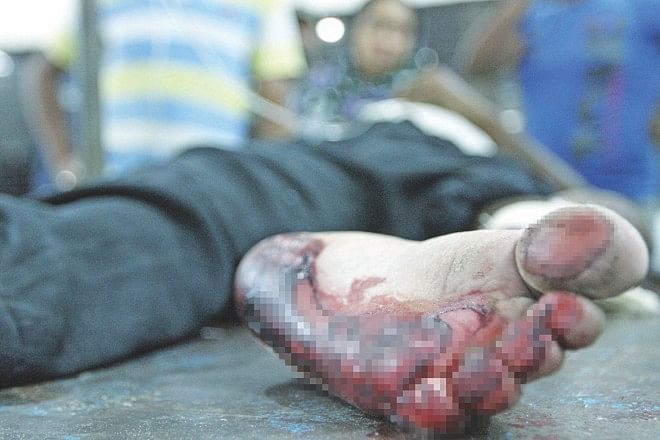
Montu Chandra Paul lost the battle five days later, leaving his beloved wife, a widow at the age of 25.
Before many hours have gone by, another arrives. Metal stretchers rush down the hall, the clatter leaving a lasting ringing in the head. The body crashes into the cold steel, the contact jolting life back into him and he lets out a blood curdling scream. The screams never really seem to end.
They scream when the doctors slather salve on the torn exposed flesh, like Shahidul with a burnt face had begged doctors to saw off his head and end the pain once and for all. He was burnt on November 28 when arsonists set fire to his bus at Shahbagh.
They scream for hours afterwards gasping for air through their scalded lungs. Shahjahan's guttural cries had reverberated across the sterile white walls of the Intensive Care Unit. His last choked scream had been a death rattle. Shahjahan died on December 27, six days after he was burnt inside a CNG driven auto rickshaw in Mymensingh.
Their families come charging in, screaming, lamenting - screaming even louder upon discovering that the black bloated human form in front of them is actually their loved one.
Sabed Ali's wife let out a shriek and crashed to the ground upon first sight of her CNG driver husband on November 26. Arif, his four year old ran, out of the room screaming, unable to accept that the horrifying black mass was actually his father. The scared little boy could not be persuaded to enter the room until a day later.
Arif's reaction is a reminder of the kind of effect hartal violence has had on children.
Similar to Arif, another four year old had to see the worst that the world has to offer at a very tender age. Standing beside his father, Asad Gazi's dead body Asir's head was teeming with questions about the inhumanity of it all.
"Why is father dead? What does being dead mean?" he had asked around. When told that his father went to heaven, a place with flowers and trees, and a river, Asir scoffed incredulously.
"We have those at our village home in Barisal, too. Why does he need to go to heaven then?" he said, with the candidness only children seem to possess.
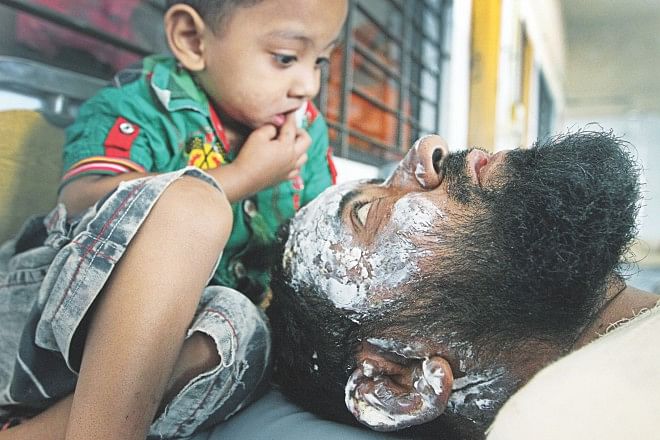
Shimul, a helper at a human hauler lost faith in humanity at the age of ten. Lying in his bed in the burn unit of the Dhaka Medical College Hospital on November 11, the ten year old had tried to come to terms with the fact that some people tried to kill him, while his ideal world crashed around him.
"The 'leguna' was full of people. They wanted to kill us all," he had whispered, his eyes glassy with the chilling recollection, "even the driver left me to die, escaping himself."
Fifteen children had their childish curiosity shattered after having their hands and eyes blown apart, when they picked up crude bombs thinking them to be balls.
Ten year old Rahima has pretty much lost all vision in one eye and partially in the other as well. Abed lost his right hand wrist-down. The rest lost several fingers each.
All the children belonged to families who could not afford to lavish upon them with toys. They play on the streets where political hooligans leave unexploded crude bombs lying around. Their toys are whatever they find.
After eight year old rag picker Surma had her hands blown away by a cocktail in Chittagong on November 5, her crying father deplored the fact that his daughter had to play with things picked up from the streets because he cannot afford to buy toys for her.
However these victims of hartal violence, who have been through some of the worst experiences life has to offer, dream of moving on, as hard as it might be.
When contacted last week, the father of Monir, a fourteen year old boy who died of arson in early November, described his life as one turned upside down by poverty and trauma.
"I lost my pick-up truck when the political activists set fire to it with my son inside. Nor can I ever forget the sight of my boy burning alive, trapped in the vehicle. After seeing all that, I cannot drive anymore," he said.
His wife has lost all grip on life, he added. Monir was the third child she had lost to the cruel turn of fate. She had previously lost one other child to a road accident, and another at infancy.
"Please help me start my life anew. I do not want to drive anymore but I need to live," pleaded Ramzan Ali.
The author is a repoter for The Daily Star.

 For all latest news, follow The Daily Star's Google News channel.
For all latest news, follow The Daily Star's Google News channel. 



Comments